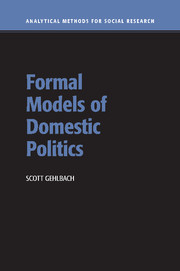8 - Regime Change
Published online by Cambridge University Press: 05 March 2013
Summary
In previous chapters, we have largely pushed collective action and institutional change to the background. In this chapter we explore the ability of citizens to force a regime change through coordinated action. We also consider the possibility that political elites respond to the threat of collective action by changing institutions on their own.
We begin by examining the collective action problem itself, focusing first on a coordination game characterized by multiple equilibria—one in which citizens challenge the regime and one in which they do not. Following this, we consider a global-games approach to collective action, where incomplete information about some aspect of the institutional environment generates a unique equilibrium that is continuous in parameters of the model. The two approaches are complementary: the first suggests a greater role for institutions in focusing expectations on particular equilibria, whereas the second emphasizes the relationship between regime type (e.g., the difficulty of regime change) and the likelihood that citizens choose to challenge the regime.
The preceding analysis provides a microfoundation for a discussion of political-regime change, where elites respond to the possibility of collective action by changing the rules of the game. We focus this discussion on a model of political transitions by Acemoglu and Robinson (2000, 2001, 2006). In this model, there is an excluded majority (the poor) that, at some cost, may overthrow a nondemocratic elite (the rich). Critically, the cost to the poor of collective action oscillates from period to period, in such a way that the rich are under pressure to redistribute to the poor only when the cost of collective action is low.
- Type
- Chapter
- Information
- Formal Models of Domestic Politics , pp. 184 - 210Publisher: Cambridge University PressPrint publication year: 2013

